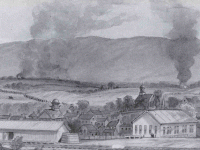The Civil War tested Mennonite’s peaceful orientation once again. Mennonites in Virginia refused to own slaves and most opposed the war. Yet they found it impossible to stay out of the contentious debate engulfing Virginia.
One instance is instructive. On the rural frontier, Mennonites often helped their slave-holding neighbors with harvest. In return the neighbor would sometimes send his slave to work for the Mennonite family. This created a crisis of conscience. Was it OK to accept slave labor as payment for helping out a neighbor? One church district in Virginia tried to resolve the crisis when it passed a resolution stating that if a neighbor sent a slave to fulfill a labor debt, the Mennonite farmer was obliged to pay for the slave labor in cash. Further, the cash would go to the slave and not to the slave owner. This, as one might imagine, did not endear the Mennonite families to their slave-holding neighbors.
In Dayton, Virginia, a Mennonite miller was given to purchasing slaves for the purpose of setting them free. His neighbors ridiculed him for wasting his money on high-priced slaves and then getting no financial return. He once paid a handsome fee for a young man who the miller immediately set free only to have the man return a few months later asking to work for the miller. The freed slave had found it too difficult to make a living as a freeman.
Even though the Confederacy made no provision for conscientious objection to military duty, most Mennonite young men refused to fight the civil war. To escape conscription some walked over the mountains into what is now West Virginia where military action was less intense. Others attempted to remain invisible, sometimes using the services of the Underground Railroad to hide. But on Sunday mornings, many came out of hiding to attend church. It was not beneath Stonewall Jackson to arrive at Weaver’s Mennonite Church near Harrisonburg on Sunday mornings where he knew Mennonite men of fighting age would be assembled. Forcing them to muster against their will, he soon found that even in battle, Mennonites had a way of remaining true to their pacifistic beliefs. In the oral history of one Rockingham County family, their ancestor was caught up in Jackson’s raid on the meetinghouse. After the first battle, Jackson asked the young man if he had shot? “I didn’t see anything to shoot at,” replied the lad. “Didn’t you see those Yanks over there?” asked Jackson. “Sure,” the boy replied. “But they are people. And I don’t shoot people.” Jackson is quoted later as saying, “There live a people in the valley of Virginia that are not hard to bring to the army. While there they are obedient to their officers. Nor is it difficult to have them take aim. But it is impossible to get them to take correct aim. I, therefore, think it better to leave them at their homes, that they may produce supplies for the army.”
Partially as a result of Jackson’s frustration, the Shenandoah Valley continued to be the breadbasket of the south, much to the chagrin of the north. To deprive the Confederate forces of sustenance, Union commander Ulysses S. Grant ordered Major General Philip Sheridan to “do all the damage to railroads and crops you can.” The Shenandoah Valley was to become a barren waste. Sheridan assigned the grizzly task to his underlings, one of which was George Armstrong Custer. Custer, along with Sheridan, seemed to relish Grant's orders as soon nearly a 100 mile stretch of the valley’s air filled with black smoke from burning houses, barns, mills, haystacks, and anything else that would burn. The autumn burning left families with no provisions for the coming winter.
Mennonite farms were especially hard hit. Historian John Heatwole notes that a few were spared when George Armstrong Custer inexplicably refused his orders, stating that he could not burn out pacifists who were non-combatants. In a six-mile stretch south of Dry River, Mennonite farms were spared. On occasion he announced to Mennonite families in advance that their barn was about to be burned. The family would quickly draw buckets of water, ready to douse the token fire set by Custer and his troops. Yet by the time he crossed Dry River, Custer was burning Mennonite farms along with all others.
After the war ended, Custer expressed no such conscience when he traveled to South Dakota’s Black Hills, a territory off limits by treaty to white men, to fight Indians. In making the Black Hills safe for gold prospectors, Custer, along with members of his immediate and extended family, lost their lives.



2 Responses